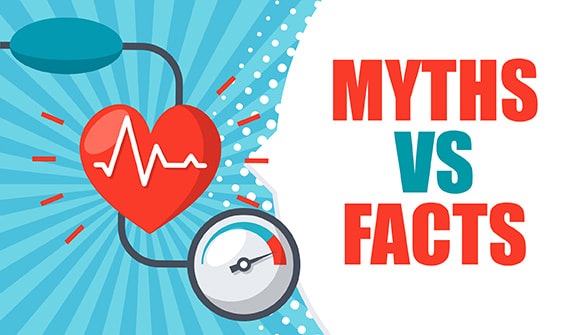Blood pressure myths
Spoiler: Nixing the table salt isn’t enough to prevent hypertension.
Article Date:

Everyone knows the drill: When you visit your doctor, he or she will take your weight, listen to your heart and lungs, and check your blood pressure. The 2021 Hypertension Guidelines, endorsed by the American Academy of Family Physicians, count a reading of 140/90 as high blood pressure, also known as hypertension. The higher the number on either side, the worse the condition is.
While having high blood pressure may not seem like the worst diagnosis in the world, there's a reason your doctor checks it each and every time you're in the office. Hypertension can take a toll on your body if left untreated.
Solange Burnette, MD, a family physician with Baptist Primary Care, debunked common myths about high blood pressure and explained the facts she'd like you to know instead.
Myth: I don't have symptoms, so I don't have high blood pressure.
People with severe high blood pressure may experience difficulty breathing, headaches, vision changes, chest pain and more. But others may never feel a thing, which is one reason getting your annual screening is so important.
"Even when people feel fine, having untreated high blood pressure over time causes damage to the internal organs," Dr. Burnette said. "Often, by the time they feel anything, it's a sign they already have irreversible damage."
Myth: High blood pressure runs in my family; I can't prevent it.
If you have a family history of high blood pressure, you're at increased risk of developing the condition, too, Dr. Burnette said.
"It becomes even more important to get regular checkups and detect it early if you have a family history of high blood pressure. Although you may not avoid having high blood pressure, early detection and treatment will prevent complications," she said.
The risk of hypertension increases with age. At age 60, roughly 60% of people have it, and at age 90, 90% will. A healthy lifestyle may delay the onset of high blood pressure and help to control it.
Myth: My doctor monitors my blood pressure reading, so I don't need to measure it at home.
Blood pressure monitors are easy to find in major retail stores and online, and they're fairly inexpensive. If you have high blood pressure, these devices are a worthwhile investment in your health.
"Monitoring your blood pressure at home and bringing a blood pressure log to the office will help your doctor decide if you need to start or adjust your treatment. Many people experience higher readings at the doctor's office, known as 'white coat hypertension.' Home monitoring is essential to detect those cases," Dr. Burnette said.
If your doctor recommends you monitor your blood pressure at home, be sure to ask about the best techniques for getting accurate readings..
Myth: I don't add salt to my food, so I don't have to worry about high blood pressure.
Taking salt off the table and opting for low-sodium goods in the canned aisle are good practices. Unfortunately, reducing sodium intake isn't enough on its own to prevent or treat hypertension.
Aside from monitoring sodium intake, other lifestyle practices such as regular physical activity and maintaining a healthy weight are important too, Dr. Burnette said.
"If your blood pressure is not extremely high, your doctor may recommend lifestyle changes before starting medication. If you follow those recommendations and your pressure is still elevated, medications are crucial to controlling it," she said.
Myth: High blood pressure doesn't cause serious disease.
When it comes to high blood pressure, an ounce of prevention really is worth a pound of cure. Chronic hypertension can lead to vision impairment, damage to veins and arteries throughout the body, erectile dysfunction, neuropathy and many more issues.
"The consequences of untreated hypertension can be devastating. Stroke, dementia, heart attack, congestive heart failure, kidney failure and other serious conditions are possible," Dr. Burnette said. "Keeping your blood pressure well controlled can significantly decrease your risk."
Get treatment for your high blood pressure
Do you need a primary care physician who can help you find the right treatment plan for your high blood pressure? Baptist Primary Care has locations across Northeast Florida area so you can find care close to you. Call 904.202.4YOU (202.4968) or request an appointment online.




